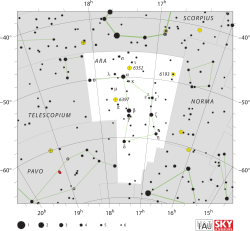Epsilon1 Arae
| Observation data Epoch J2000.0 Equinox J2000.0 | |
|---|---|
| Constellation | Ara |
| Right ascension | 16h 59m 35.04880s[1] |
| Declination | –53° 09′ 37.5713″[1] |
| Apparent magnitude (V) | +4.068[2] |
| Characteristics | |
| Spectral type | K3 III[3] |
| U−B color index | +1.71[4] |
| B−V color index | +1.45[4] |
| Astrometry | |
| Radial velocity (Rv) | +23.1[5] km/s |
| Proper motion (μ) | RA: +2.16[1] mas/yr Dec.: +22.04[1] mas/yr |
| Parallax (π) | 9.04 ± 0.27 mas[1] |
| Distance | 360 ± 10 ly (111 ± 3 pc) |
| Absolute magnitude (MV) | –0.79 ± 0.16[6] |
| Details | |
| Mass | 1.74 ± 0.24[7] M☉ |
| Radius | 33.7 ± 3.4[7] R☉ |
| Surface gravity (log g) | 1.80[2] cgs |
| Temperature | 4,176[2] K |
| Metallicity [Fe/H] | 0.08 ± 0.05[2] dex |
| Age | 1.70 ± 0.57[7] Gyr |
| Other designations | |
| Database references | |
| SIMBAD | data |
Epsilon1 Arae (ε1 Ara, ε1 Arae) is the Bayer designation for a star in the constellation Ara, the Altar. It is visible to the naked eye with an apparent visual magnitude of +4.1[2] Based upon an annual parallax shift of 9.04 mas,[1] this star is around 360 light-years (110 parsecs) distant from the Earth.
ε1 Arae is an evolved giant star[7] with a stellar classification of K3 III.[3] It is around 74% more massive than the Sun. At an age of about 1.7 billion years, the outer envelope of the star has expanded to almost 34 times the Sun's radius.[7] It is radiating energy into space at an effective temperature of 4,176 K,[2] giving it the orange-hued glow of a K-type star.[9]
ε1 Arae was known as 龜一(spelled as "Guī yī", meaning: "the 1st (star) of Guī") in traditional Chinese astronomy.[10][11] Allen erroneously called it Tso Kang (左更).[12] He probably confused the constellation "Ara" with "Ari", as Tso Kang is actually in Aries.[10][11]
References
- ^ a b c d e f van Leeuwen, F. (November 2007), "Validation of the new Hipparcos reduction", Astronomy and Astrophysics, 474 (2): 653–664, arXiv:0708.1752, Bibcode:2007A&A...474..653V, doi:10.1051/0004-6361:20078357, S2CID 18759600.
- ^ a b c d e f Soubiran, C.; Le Campion, J.-F.; Cayrel de Strobel, G.; Caillo, A. (June 2010), "The PASTEL catalogue of stellar parameters", Astronomy and Astrophysics, 515: A111, arXiv:1004.1069, Bibcode:2010A&A...515A.111S, doi:10.1051/0004-6361/201014247, S2CID 118362423.
- ^ a b Houk, Nancy (1978), Michigan catalogue of two-dimensional spectral types for the HD stars, vol. 2, Ann Arbor: Dept. of Astronomy, University of Michigan, Bibcode:1978mcts.book.....H.
- ^ a b Johnson, H. L.; et al. (1966), "UBVRIJKL photometry of the bright stars", Communications of the Lunar and Planetary Laboratory, 4 (99): 99, Bibcode:1966CoLPL...4...99J.
- ^ Wielen, R.; et al. (1999), "Sixth Catalogue of Fundamental Stars (FK6). Part I. Basic fundamental stars with direct solutions", Veroeffentlichungen des Astronomischen Rechen-Instituts Heidelberg, 35 (35), Astronomisches Rechen-Institut Heidelberg: 1, Bibcode:1999VeARI..35....1W.
- ^ Setiawan, J.; et al. (July 2004), "Precise radial velocity measurements of G and K giants. Multiple systems and variability trend along the Red Giant Branch", Astronomy and Astrophysics, 421: 241–254, Bibcode:2004A&A...421..241S, doi:10.1051/0004-6361:20041042-1.
- ^ a b c d e da Silva, L.; et al. (November 2006), "Basic physical parameters of a selected sample of evolved stars", Astronomy and Astrophysics, 458 (2): 609–623, arXiv:astro-ph/0608160, Bibcode:2006A&A...458..609D, doi:10.1051/0004-6361:20065105, S2CID 9341088.
- ^ "eps01 Ara". SIMBAD. Centre de données astronomiques de Strasbourg. Retrieved 2012-07-28.
{{cite web}}: CS1 maint: postscript (link) - ^ "The Colour of Stars", Australia Telescope, Outreach and Education, Commonwealth Scientific and Industrial Research Organisation, December 21, 2004, archived from the original on 2012-03-18, retrieved 2012-07-21.
- ^ a b Chevalier, S., and Tsuchihashi, P., (1911): "Catalogue d'Étoiles fixes, observés a Pekin sous l'Empereur Kien Long (Qianlong (Chien-Lung)), XVIIIe siecle", Annales de l'Observatoire Astronomique de Zô-Sé.
- ^ a b 伊世同 (Yi Shi Tong) (1981): 『中西対照恒星図表』科学出版社.(in Chinese)
- ^ Allen, R. H. (1963), Star Names: Their Lore and Meaning (Reprint ed.), New York, NY: Dover Publications Inc., p. 64, ISBN 0-486-21079-0.
Further reading
- 大崎正次 (1987): 「中国の星座・星名の同定一覧表」『中国の星座の歴史』 雄山閣出版, pp. 312, 326.(in Japanese)

